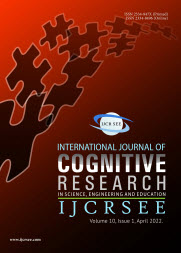Conceptual Predictors of The Adolescents With Different Cognition Types Intellectual Activity
Conceptual Predictors of The Adolescents With Different Cognition Types Intellectual Activity
Author(s): Irina Kibalchenko, Tatiana Eksakusto, Oksana IstratovaSubject(s): Educational Psychology
Published by: Удружење за развој науке, инжењерства и образовања
Keywords: conceptual structures; intellectual activity; cognition;adolescents;
Summary/Abstract: Such predictors of intellectual activity as categoric, conceptual and semantic ones are analyzed in the article; the analysis is aimed at defining structural peculiarities of the adolescents’ conceptual predictors exemplified by the adolescents with open-minded, closed-minded and neutral (mixed) cognition. Design of the research can be defined as a deductive-correlated one. The research is based on mixed-method studies, containing qualitative and quantitative methods of the data processing and interpreting. Principal Component analysis (PCA) as well as the Kruskal-Wallis rank sum test (IBM SPSS Statistics) allowed us to find out peculiarities of the adolescents with different cognition types intellectual activity conceptual predictors. The average value of the factor structures summary dispersion and differences in predictors significance values from p≤0.01 to p≤0.05 reflects the veracity of the research results. The research proves that adolescents with open-minded cognition are characterized by well-developed long-term semantic memory, i.e. they are able to generate more ideas (Hemp. = 12.082, р≤0.01), their categoric abilities are highly developed (Hemp. = 13.764, р≤0.01). Factor structure in this group of adolescents is a sign of conceptual abilities and conceptual predictors systems integration. The level of cognition openness is one of the basic characteristics of intellectual success. The attained statistic results prove that there are great differences between structural peculiarities of the adolescents with different cognition types intellectual activity conceptual predictors; the results of the research are as well indicatives of the fact that intellectual activity of adolescents with different cognition types is conditioned by the conceptual predictors structure.
Journal: International Journal of Cognitive Research in Science, Engineering and Education (IJCRSEE)
- Issue Year: 10/2022
- Issue No: 1
- Page Range: 93-105
- Page Count: 14
- Language: English

